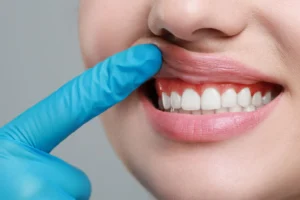When it comes to taking care of our teeth, sometimes despite our best efforts, things can go wrong. Whether you’re experiencing severe pain, swelling, or bleeding, it’s not always easy to determine if your situation calls for an emergency tooth extraction. While no one wants to think about having a tooth removed, there are certain circumstances in which it becomes necessary. In this article, we’re going to cover what emergency dentistry is, and the signs to watch for that indicate you need an emergency extraction.
What Is An Dental Emergency & What is its Connection To Emergency Teeth Extractions
A dental emergency is a situation where an individual requires immediate dental care to alleviate pain or to prevent further damage to their teeth or gums. Dental emergencies can include severe toothaches or pain, the inability to stop bleeding gums, broken or chipped teeth, tooth loss, infections or abscesses, and lost dental fillings.
Sometimes, emergency teeth extractions, which is when one or more teeth are removed from the socket in the bone, are necessary if your teeth become too infected or damaged and cannot be saved by other treatments. When you go in for an emergency tooth extraction, the aim is to relieve the patient from pain, restore function, and prevent damage to the overall oral health of the patient. Here is how to tell if you need to book in for a tooth extraction:
1. Your Gums Are Bleeding Without Cause or Non-stop. Bleeding gums can be a sign of serious dental problems, such as gum disease, infection, or trauma. If your gums are bleeding without cause or non-stop, you may need an emergency tooth extraction to prevent further damage and complications. An emergency tooth extraction can remove the source of infection or inflammation, reduce pain and swelling, and allow your gums to heal faster.
2. You Have Broken or Cracked Teeth. Sometimes a tooth can break or crack due to trauma, decay, or biting on something hard. Depending on the extent of the damage, you may or may not feel pain. However, a broken or cracked tooth can expose the nerve and pulp of the tooth, making it vulnerable to infection and further damage. If you notice that your tooth is broken or cracked, you should contact us as soon as possible to prevent complications like infection, dental cavities, or shattered teeth.
3. You’re Experiencing Jaw Stiffness & Pain. Another sign to watch out for is if you have jaw stiffness and pain, which can be a sign of impacted wisdom teeth. Your wisdom teeth are the last set of molars that erupt in the back of your mouth, usually between the ages of 17 and 25, and for some they come in and grow normally. But, for many, wisdom teeth can become trapped under the gum or bone and cannot emerge properly. Impacted wisdom teeth can cause pain, infection, cysts, damage to neighboring teeth, and misalignment of your bite. If you have impacted wisdom teeth, we recommend having emergency teeth extractions to pull them out and prevent future complications.
4. You Recently Had a Root Canal & It’s Failed. A root canal is a procedure that involves removing the infected or damaged pulp of a tooth and sealing it with a filling or a crown. A root canal can save a tooth from extraction by preserving its structure and function. However, sometimes a root canal can fail due to reinfection, fracture, or improper sealing. If this happens, you may experience pain, swelling, or drainage from the affected tooth. In some cases, a failed root canal can be retreated or repaired by your dentist. In other cases, the only option may be to complete an emergency tooth extraction, and replace it with an implant or bridge.
5. You Can Shift Your Teeth Around. If you notice that your tooth is loose or shifting in your mouth, it could be a sign of advanced gum disease or bone loss. Gum disease is a chronic infection of the gums and tissues that support the teeth. It can cause inflammation, bleeding, and receding gums, as well as damage the bone that holds the teeth in place. If you have a loose or shifting tooth, you should see your dentist right away to evaluate your condition and determine the best course of treatment.
6. Past Restorations Have Become Damaged. Over time, fillings, crowns, or bridges that have been used to restore a damaged tooth can become damaged themselves. When this happens, the tooth beneath may be exposed to bacteria, which can cause infection and severe pain. In such cases, an emergency tooth extraction may be the only solution to remove the damaged tooth and prevent further harm to your oral health.
7. You Have Severe Pain & Facial Swelling. If you have a toothache that is so intense that you can’t sleep, eat, or function normally, you may have an infection or an abscess in your tooth. This can be a life-threatening condition if left untreated, as the infection can spread to your jawbone, bloodstream, or other parts of your body. You should seek immediate dental attention if you experience severe pain and swelling in your mouth, face, or neck.
8. You Suspect A Dental Abscess or Infection. A dental abscess is a collection of pus that forms down near the tooth’s root or at the gum line due to a bacterial infection. It can cause severe pain, swelling, fever, and bad breath. If left untreated, it can spread to other parts of the body and cause serious complications. If caught early enough, treatments like antibiotics, root canal therapy, or drainage can be used if the abscess isn’t severe and is in an easy-to-access location. However, an emergency tooth extraction may be necessary if these other treatments are not possible, and swift action is needed to prevent the spread of infection.
In conclusion, emergency tooth extractions may be necessary due to a variety of reasons and can be a daunting experience for many patients. However, at Spring Haven Dental, we strive to provide a comfortable and stress-free environment for all our patients. If you are experiencing any of the symptoms we discussed in this article, we urge you to seek immediate dental care to prevent further damage and discomfort. Our team of experienced professionals is always ready to assist you with any dental emergencies you may face. Don’t suffer in silence, contact us today to schedule an appointment and take the first step towards a healthier and pain-free smile.






